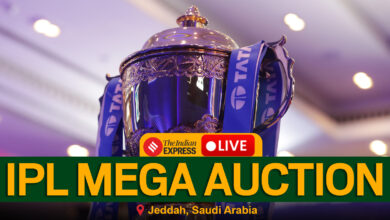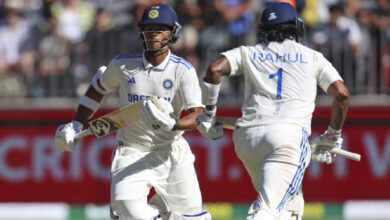FIDE can reject Russian companies because we have diversified sponsor base: director-general Sutovsky

International Chess Federation’s (FIDE) Director-General Emil Sutovsky is also a Chairman of its Global Strategy Commission. In a chat with The Indian Express, the Israeli Grandmaster talks about the FIDE Council’s decision to terminate all sponsorship agreements with Belarusian and Russian state-controlled companies, and why FIDE is different today, in terms of its sponsor pool and also increasing the reach of the game. Excerpts.
FIDE Council:
Condemn Russia’s military action. Russian&Belarus players to play without national flags. Stop sponsor contracts with sanctioned and state-controlled Rus/Blr companies. India bid received – 10 days more for bids. Karjakin and Shipov to Ethics&Disciplinary.
— Emilchess (@EmilSutovsky) February 27, 2022
The FIDE council, among other decisions, cut ties with Russian state-sponsored companies. Would you say FIDE is less reliant on funds from Russian companies, unlike in the past?
Basically FIDE has expanded its work. We are now well-diversified and that has helped. We are working with all major chess federations and sponsors from around the world. Earlier FIDE was dependent on a very narrow circle of countries, first and foremost Russia, but there were also a few others.
We have been able to save many events because of this cooperation with many countries.
Like with the Chess Olympiad this summer, which was removed from Moscow – and we got several countries willing to stage it – and India is among them. Or the recent World Rapid and Blitz Championships that was held in Poland after Covid restrictions forced it to be moved from the original venue (Kazakhstan). And Poland is one of the biggest critics of the Russian government. Of course, FIDE is very compassionate about Ukrainians and their civilians have suffered a lot – hence decisions had to be made.
FIDE has terminated its contract with Russian energy giant Gazprom. To what extent does this affect funds at FIDE’s disposal?
It is going to affect us because it was a significant income for FIDE. But that said it will not have an impact in a life or death way. I would say income from Russian companies was estimated at 20 % to 25 % from our overall sponsorship and broadcast income in 2022. If we compare, say, with 2019, it was way above 50 percent. Prior to 2019, FIDE’s income was largely from two things; the Russian companies and the fees FIDE was charging from players, federations and events. When we came in (after the 2018 elections), one of the promises which FIDE made was to reduce or waive fees. Today the total fees FIDE charges from players and the federations has reduced 80 per cent. Senior players don’t pay at all; players from developing countries don’t pay at all. Fees for titled players became less. Another example is the way youth competitions are funded today. Previously, FIDE earned money from youth competitions but now we are spending money to develop chess all over the world.
Most talented kids from all over the world study with the best trainers for free throughout the year in the framework of FIDE Chessable Academy.
Top-level competitions saw a massive increase in prize money – not only the exing events saw an increase, but we created new competitions. We have also raised the prize money in women’s chess more than two-folds.
World Championship Match prize pool went from 1M to 2M Euro, Women’s World Championship from 200K to 500K Euro. Nearly all of this growth became possible thanks to new agreements and sponsorships – mostly from the Western countries, but also we had a massive fruitful cooperation with Dubai Expo 2020, smaller but important agreements with OCP (Morocco) and the city of Shenzhen (China).
When did FIDE realise its overdependence on state-owned companies?
When I joined the team of FIDE president-elect Arkady Dvorkovich (in 2018), I said we should aim to diversify. It was one of the first promises. First meeting of the newly-elected FIDE Board took place in London and the sentiment was clear that FIDE should take a large step away from being focused on a small l of countries and sponsors. It is not that we are not appreciating the previous funds, which went into chess. We are grateful to companies who supported chess throughout the years – but it was evident that in order to be truly global, FIDE has to expand and diversify.It is difficult to give an exact count of how many sponsorship tie ups we have got into with private companies because there were so many projects, including smaller ones. But it would be safe to say over 20.
We have been working with sponsors from newly emerging spheres like Coinbase, which is an American crypto platform, and traditional ones like Total, a French Oil and Gas Company. We had three projects with Coca Cola Europe and a two-year contract with NASDAQ-traded Establishment Labs. Diversifying our sponsor base has helped us to be in a position where we can reject Russian companies which are under sanctions. It does have an impact on our budget, but we feel that it is a morally right step.
When you had to diversify in terms of finding new sponsors, how did you go about it?
FIDE didn’t have a marketing department nor had FIDE compiled any pitch or presentation before 2018. When our team came in, I became a person in charge of marketing and sponsorships. The first thing we commissioned was a few surveys among the general population and chess public. We looked at countries where chess was already popular and where it had a potential. Age groups, genders, income-related etc.
And of course, we started to talk to people. That allowed our partners-to-be to realize FIDE is reliable. We have a vision. I am not going to say we made a revolution but obviously it made a huge difference. During the pandemic more and more people started following the game and then the broadcasting rights were on demand. Today we have contracts with Chess.com and Chess24.com (worth over 7 million Euro), multi-year agreement with Norwegian NRK, we managed to strike an agreement with NBC Sport for the world championships in Dubai and at the same time we had an agreement with Match TV in Russia.
As a Director-General of FIDE are you worried about repercussions from Russia, a powerhouse with a long tradition of chess, in the future? The current FIDE president Arkady Dvorkovich is former deputy prime miner of Russia?
I think we have clearly expressed ourselves on the situation (Russia’s invasion of Ukraine) and the action we took was objective. I don’t think any of Dvorkovich’s critics can come up with one instance where he was unjustly pro-Russian throughout the last 3.5 years. Dvorkovich was a chairman (local organising committee) of the FIFA World Cup held in Russia. He is extremely experienced as a manager – and as a matter of fact you can compare FIDE today with the one it was in 2018. A budget that increased 300%-400%. Just one figure: the FIDE budget for support of chess development and related social and educational programs stands at 2M Euro in 2022. The entire budget of FIDE prior to 2019 never exceeded 2.5M Euro.
I can understand there will be negative sentiments from some purely because he is a Russian citizen who serves as a FIDE president. But FIDE proved – way before the war in Ukraine started, that we are now big enough and strong enough not to be dependent on the policies of one country. The FIDE Council has members from all across the world. And of course, if the FIDE President would have ever tried to build FIDE in a pro-Russian manner, it would have been known – especially now, when many people are playing out this card. But the reality is different. And I firmly believe you cannot ban every Russian just because he or she is Russian.
Chess world is very dear to Dvorkovich’s heart, as well as to the members of the FIDE Council and Management Board, and we will keep delivering in spite of all the challenges.







